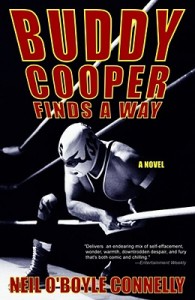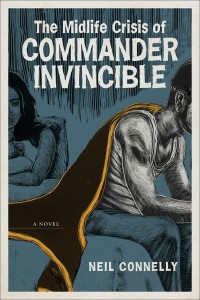 Neil Connelly writes strong, sure sentences about people mired in personal weakness and uncertainty. In two novels classified as young adult (St. Michael’s Scales and The Miracle Stealer) and two classified as adult fare (Buddy Cooper Finds a Way and the just-released LSU Press title The Midlife Crisis of Commander Invincible), he peels away exterior layers of the avowedly lost and doubting until they find a center that can hold.
Neil Connelly writes strong, sure sentences about people mired in personal weakness and uncertainty. In two novels classified as young adult (St. Michael’s Scales and The Miracle Stealer) and two classified as adult fare (Buddy Cooper Finds a Way and the just-released LSU Press title The Midlife Crisis of Commander Invincible), he peels away exterior layers of the avowedly lost and doubting until they find a center that can hold.
His characters stumble through the muck of their lives and sometimes wallow in it, but Connelly is one of the most tender and loving authors a character could wish for. He won’t leave them high and dry and hopeless, and he’ll stick with them until they show, like a young calf or colt, that they are capable of standing on their own.
In Commander Invincible he gets us under the skin of a crumbling Vincent Shepherd: just turned forty, teetering at the edge of a second divorce, and about to be fired from the cadre of variously-powered superheroes that guard his city. While he sometimes ping-pongs between the whiz-bang action of the comic superhero and the interiority of the literary protagonist, Connelly–who grew up steeped in the comic world and worked in a comic book store as a teenager–spends most of the novel in a territory that is common to both.
Looking back, I wondered how he brought me along for that particular ride–making me worry about the consequences of Vince’s lies to his son while waiting for the next behind-the-scenes intrigue among the superhero crowd. What Connelly has done is not so much to suture together literary fiction and the comic world, but created a work equally steeped in both. We talked, just as Commander Invincible was about to launch, as he enjoyed a family summer in his home state of Pennsylvania.
Interview:
I know that Commander Invincible has been on your mind for a long time because I met him under another name in a 2005 story of yours from River City (now The Pinch) out of the MFA program at the University of Memphis. He was then Carter Thompson (a.k.a. Ultimate Man). What’s the relationship between that story and this novel, and what happened along the way while Carter became Vince?
Ultimate Man was a test run, pure and simple. In between novels, I find myself trying things out, sometimes with elements like time, sometimes with a risky voice, as in this case. The question was, “Can I pull off a literary story set in a superhero universe?” And the answer, to me at least, was yes. That being said, it was still years until the kernel of an idea worth a novel set in such a world lodged itself in my head. So while the short story didn’t evolve directly into the novel, it certainly opened my mind to the possibilities.
 There’s a resemblance between Vince from the new novel and the protagonist of Buddy Cooper Finds a Way (Scribner, 2004). Like Vince, Buddy pops pills, has marriage problems, and wears tight-fitting costumes as a pro wrestler. Can you talk about your fixation with down-and-out characters in capes?
There’s a resemblance between Vince from the new novel and the protagonist of Buddy Cooper Finds a Way (Scribner, 2004). Like Vince, Buddy pops pills, has marriage problems, and wears tight-fitting costumes as a pro wrestler. Can you talk about your fixation with down-and-out characters in capes?
David Leavitt’s got a great bit on how all writers have fixations, obsessions—themes and motifs they can’t get away from. I guess some of mine are fairly obvious. Almost all fiction deals with alter egos, if you think of how readers move from one level of understanding of a character to another. We may not have them wearing literal masks, but so often, they are hiding something, either from others or themselves. When readers learn this secret, when they share the same essential understanding as the author, then the story is over.
As far as down-and-out types, who the hell wants to read about people who have it made? In his excellent book Burning Down the House, Charles Baxter notes that the best life you could live, where you have a supportive, healthy family, where you marry your high school sweetheart, have a great fulfilling job, wonderful kids, die in your sleep, etc—all that’s the best way to live, but it’s a terrible work of fiction. We read for trouble.
That also brings to mind a mistake of novice writers, falling so in love with their characters (shadow-selfs, of course), that they make life too easy. They don’t beat them up enough, put them in real harm’s way.
 Two of your novels—St. Michael’s Scales (2002) and The Miracle Stealer (2010)—are from Arthur A. Levine, a young adult publisher, and two of them are for what gets called the adult market. Do you feel any bifurcation creatively in these two lines of work?
Two of your novels—St. Michael’s Scales (2002) and The Miracle Stealer (2010)—are from Arthur A. Levine, a young adult publisher, and two of them are for what gets called the adult market. Do you feel any bifurcation creatively in these two lines of work?
Very little, if any. I was trained to write the stories I wanted to write, then figure out if and where they could be published later. Looking at market trends while in the process of creating a novel seems whacky to me. That advice I got was good for an aspiring artist and terrible advice if the real goal is to be published. But I do see one as leading to the other, for a certain kind of writer. I think good writing is more likely to get published than bad, and I think a way to increase your odds of writing good, honest, unique work is to totally ignore what’s selling this week.
The only difference between my books for me is that the YA novels have teen protagonists. I employ the same diction, style, etc, and there are no taboo topics in the YA world. Folks think you need to dumb it down for younger readers, which is crazy. They want to be engaged and challenged.
What about the “business” end of writing for these two markets? Do you find that the relationships you have with editors and other publishing professionals—as well as readers—are different from each other?
My experience with each of the three publishers (and five editors) I’ve dealt with has been different, though I ascribe that to personality more than the publishing houses. There are, of course, financial realities. But with each, I’ve found thoughtful people trying carefully to balance the concerns of art and commerce.
As far as the readers go, I will say that it’s a delight to interact with younger readers especially. You walk into a middle school or a high school, and these kids have read your book, and they have this strange reaction, like you’ve flown in from Krypton or something. Most haven’t met an “author” before, and they ask questions that show how the whole publishing thing seems mystical to them. It’s nice to bring them back to earth, to minimize the distance between writer and reader.
 On the surface, the societal world of The Midlife Crisis of Commander Invincible is similar to what we find in contemporary superhero work, particularly in the way that the “supers” are being put out to pasture—something we see in the children’s movie The Incredibles and in the X-Men series. To what extent to you embrace it, and where do you see yourself leaping off from it?
On the surface, the societal world of The Midlife Crisis of Commander Invincible is similar to what we find in contemporary superhero work, particularly in the way that the “supers” are being put out to pasture—something we see in the children’s movie The Incredibles and in the X-Men series. To what extent to you embrace it, and where do you see yourself leaping off from it?
We all breathe the same air. In a culture like ours, we read the same books, watch the same movies, etc. So sure, of course, especially as a kid who loved comics, these things were on my radar (as well as works like Sin City, Watchmen, etc.). Yet few folks write a novel without having read one, right? We read (or watch) in part to see what’s possible. That’s why it’s important to look hard at other stories. They can be like maps from other explorers, and you often find yourself going, “Yeah, I see now how you could go there. That looks like fun.”
One of my favorite aspects of the novel was the quick, occasional glimpses into alternate realities in which Vince is another person: Earth 1.2, Earth 1.7, etc. He never seems to learn anything from these other selves, and I could easily see the novel unfolding without them. Why did you keep them in?
I liked them too. That’s the short answer. And I agree, upon reflection, that they seemed kind of fruitless pursuits, that Vince doesn’t walk away from any of them with some huge galactic insight. But epiphanies are hard to come by, and I guess his not finding any, despite that whole odyssey to get home (it really could’ve been a book by itself; I considered that), suggests to me that we have to learn to live without answers.
Given your subject matter and your long-term fascination with comics, why did you choose to write Vince’s story as a traditional novel and not a graphic novel?
I’m a novelist. I love the idea of collaboration, but I’ve never embarked on it on a large scale. When I began writing, it came out like all my other books. An image, an image, a scene, an image, a scene. Etc.
What’s your next creative direction? Will there be capes? Teenagers? Wrestling?
I’ve spent some time with angels and demons, literally, and I hope something comes from that. I’ve also found myself thinking back to Louisiana, where I lived for almost 20 years before returning home to Pennsylvania recently. Once you leave a place, you can write about it better. But I can guarantee, whatever comes next, there will be trouble for the characters.
Further Links and Resources:
- For more on superhero fiction, check out Sean Beaudoin’s recent interview with Samuel Sattin, author of League of Somebodies.
- Or for more on YA lit, read Katherine Carlson’s interview with Adam Rex, author of The True Meaning of Smekday, and other titles.
- You can also read Charles Baxter’s essay “Owl Criticism.”
- Or follow up on more of Steven Wingate’s literary interviews for FWR.
- For more about Neil Connelly and his work, please visit his website.
- Read Connelly’s story “The Dad in Question” from Gulf Stream.
Contributing Editor:
 Steven Wingate‘s debut short story collection, Wifeshopping, won the Bakeless Prize in Fiction from the Bread Loaf Writers’ Conference and was published by Houghton Mifflin Harcourt in 2008. His prose poem collection Thirty-One Octets: Incantations and Meditations is forthcoming from WordTech Communications/CW Books in late 2013. He is an Assistant Professor at South Dakota State University, where he directs the Great Plain Writers Conference. Visit his website: www.stevenwingate.com.
Steven Wingate‘s debut short story collection, Wifeshopping, won the Bakeless Prize in Fiction from the Bread Loaf Writers’ Conference and was published by Houghton Mifflin Harcourt in 2008. His prose poem collection Thirty-One Octets: Incantations and Meditations is forthcoming from WordTech Communications/CW Books in late 2013. He is an Assistant Professor at South Dakota State University, where he directs the Great Plain Writers Conference. Visit his website: www.stevenwingate.com.





